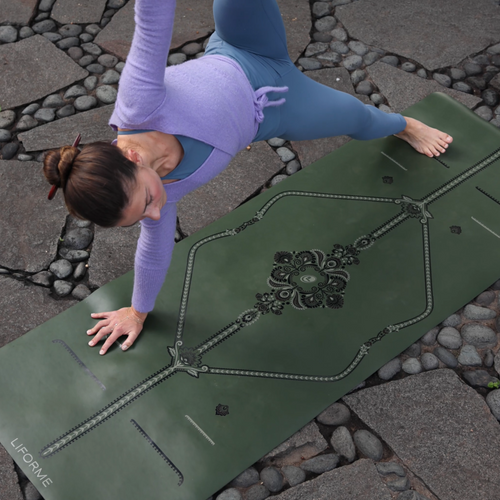Have you ever heard the slogan “Every Day is Earth Day,” and wondered how make your daily life more sustainable? You can do your part in your own household by making small changes that result in the use of less power, less water, less paper, and less harmful plastics. As yogis, we often talk about how to take your yoga off the mat. Making simple, everyday choices for the greater good is one huge way to step up.
1. Put on a sweater
In the 1970s, U.S. President Jimmy Carter suggested that Americans could save energy by putting on a sweater instead of turning their heating up. The media acted as if this idea was absurd, but it turns out Carter's folksy solution was way ahead of its time.
Although heating and air conditioning are necessary in many climates, there are many ways to modify your habits so that you’re both comfortable and easier on the thermostat. In the colder months, snuggle under cosy blankets wearing fuzzy socks and sipping hot grog rather than cranking up the heat. Switch to lightweight bedclothes, fans, and bikinis in the summer.

2. Cold wash and air dry your yoga togs
Your stretchy leggings, sports bras, and cute, strappy tops will last longer and fit better if you launder them in cold water and let them air dry. When you machine wash, choosing cold water is key because experts estimate that hot water accounts for 75-90% of the energy used in a load of laundry. Modern detergents and washing machines have been designed to get a good wash out of a cold water cycle.
If your sweaty yoga wear seems to retain, ahem, odours, try adding either white vinegar or baking soda to your wash cycle (but not both, unless you’re building a science fair volcano!). Use just a little detergent and no fabric softener when washing, since build-up of these agents can also lock in bad smells. Letting workout clothing dry after class and turning them inside-out before washing also help to keep unpleasant smells at bay. If you have a particularly stubborn stink, try popping the item in the freezer overnight.
Outdoor drying also helps dispel lingering odours. If you live in a warm climate and have a backyard, go for the charming European look by stringing up a few clotheslines to expand your air drying capacity.
3. Reduce your paper mail
In this age of e-communications, getting a hand-written love letter by snail mail is exciting. Getting junk mail and bills is not. Those catalogues, credit-card offers, and cable TV mailers are a big waste of paper (aka trees). When you’re ready to get serious about reducing your unsolicited mail, start by making a pile of the things you no longer want to receive. Strategies from there will vary by country. In the U.K., you can opt-out by registering with the Royal Mail. The U.S. Mail doesn’t provide this service, but both countries have a Direct Marketing Association that offers a ’Do Not Mail’ list. In the U.S., check out Catalog Choice to remove your name from multiple mailing lists at once.
Sign up for paperless statements and billing whenever you can. You can usually do this with your credit cards, utilities, phone, internet providers, everything, really. Most companies make it easy because they prefer paperless as well. You’ll save time and money when you pay your bills this way. Some people like the convenience of allowing automatic drafts from their bank accounts but you can also pay online manually each month if you prefer. Also, consider receiving your newspapers and magazines in digital form instead of on paper. Electronic editions of newspapers also keep you better updated as news breaks.

4. Turn things off
Turning off anything electric when it’s not in use saves power. Lights are the place to start. Even if you work at home, every light in the house doesn’t need to be on all day. If you have kids, turn off everything after they’ve left for school. As incandescent light bulbs burn out, replace them with LED or compact fluorescent models, which cost more initially but use less power and last longer.
Set your computer to sleep after 10 minutes of inactivity and turn it off at night. Most experts agree it’s better to turn off air conditioners and heating systems when you’re not at home. It may take a few minutes to get to your desired temperature when you return, but it’s more cost-effective than cooling or heating an empty house.
Turn off electronics (like your home printer) that idle in standby mode for days without use. Anything with a little light or a digital display draws a small amount of power, though newer models have been designed to minimise this. You don’t have to become a maniac who crawls under the furniture to unplug the TV every night, but a quick walk around your living space will probably reveal many items that can be conveniently turned off.
Little Changes, Big Differences
Once you start making this type of small lifestyle changes, you'll undoubtedly begin to notice other things you can do around your house to save energy and money. Living more sustainably has a ripple effect, as communities and countries begin to prioritise a healthy planet.





































